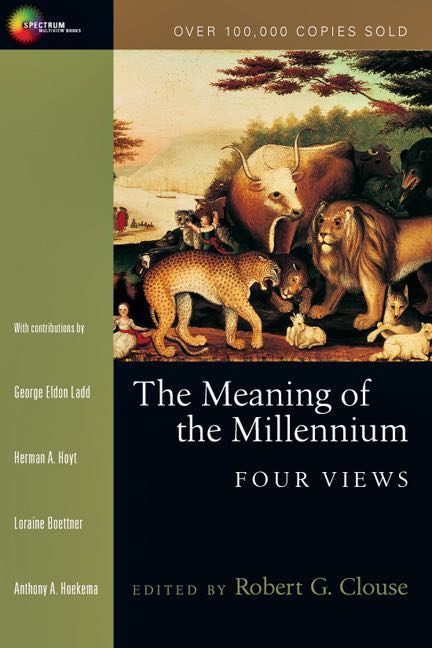The Meaning of the Millennium: Four Views
Reviewed date: 2011 Feb 23
212 pages
Revelation chapter 20 speaks about a period of 1000 years. What exactly does that millennium mean and how will it play out? This short book presents four different interpretations of the millennium.
- Historical Premillennialism: This version of premillennialism is labeled historical to differentiate itself from the relatively new Dispensational interpetation. Christ will return to Earth and reign over an earthly kingdom for a thousand years (that's the millennium.) During this time, the promises made to the nation of Israel will be fulfilled, though we don't know precisely how.
- Dispensational Premillennialism: Similarly to the historical premillennialism, the dispensational model expects Christ to return and reign for a thousand years in an earthly kingdom. The main difference is that dispensationalists see history as divided into "dispensations", e.g., periods of time where God works in specific ways. This is the dominant theology within Evangelicalism.
- Postmillennialism: As the gospel is preached and disciples are made throughout the world, the world will generally get better and better. Eventually, Christianity will become the dominant force in the world. Although sin will not be eradicated, it will be reduced to a minimum. This period of Christian dominance is the millennium--although it may not be a literal thousand years. At it's end, Christ will return.
- Amillennialism: There is no literal millennium--or rather, the millennium represents the church age. We are currently living in the millennium, and it will end when Christ returns.
This book is a great idea, but it's poorly executed. The four different scholars aren't really on the same page; the Historical Premillennialism chapter is pretty good, but the Dispensationalism chapter focuses on explaining the model of biblical interpretation behind the theology, and neglects to really explain what Premillennial Dispensationalism teaches. On the other end of the spectrum, the Postmillennialism essay explains in great detail what will happen in the end times, but neglects to mention Scripture or to discusses Revelation 20 at all. The Amillennialism essay isn't too bad, except that it relies on a novel interpretation of Revelation that the author fails to defend.
After each view is presented, the other contributers respond to it. And this is where the book really disappoints. None of the writers seem terribly interested in responding in any detail to the others' arguments. Although in some cases, I agree: it's pretty much useless to respond to a Dispensationalist who calls his viewpoint the "biblical" view--as if the other folks are reading some other book. And there's not much to say in response to the Postmillennialist who fails to discuss the Bible when presenting his view of the millennium. But at least a genuine effort at dialog and critique would have been a help.
Unless you already have a decent understanding of the different views of the millennium, I would skip this book. It's a poor introduction to the topic. If you already know the basics, this book might help you realize that the different theologies arise from differing models of biblical interpretation. The conclusions you draw from the Bible are based largely on how you read the Bible and how you interpret prophecy. Each of the views is consistent and logical (well, more or less; I have my doubts about Dispensationalism) based on the assumptions of how to properly interpret the Bible.
